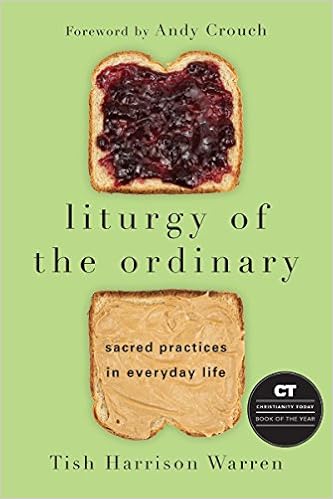 Living in seminary world, first as the wife of a seminary student and now as a student, has shaped how I view my life and being in the world. Because Southeastern Seminary is the “Great Commission seminary,” I can easily get caught up in the idea that the only parts of my life that matter are the ones spent in intense spiritual and kingdom-impacting activities like prayer, evangelism, teaching God’s Word or involvement in social justice issues.
Living in seminary world, first as the wife of a seminary student and now as a student, has shaped how I view my life and being in the world. Because Southeastern Seminary is the “Great Commission seminary,” I can easily get caught up in the idea that the only parts of my life that matter are the ones spent in intense spiritual and kingdom-impacting activities like prayer, evangelism, teaching God’s Word or involvement in social justice issues.
But so many moments in my life don’t fit that bill—they are unequivocally ordinary. If someone were to make a movie about my life, no one would watch it because it would be mundane. Most of life isn’t the big mountaintop moments; it is doing the dishes, driving to and from work, sitting at the computer, changing diapers and talking about the events of the day.
Tish Harrison Warren captures this reality in Liturgy of the Ordinary and turns it on end. She shows that every aspect of our day communicates God’s work in the world and forms us into God’s worshipers.
The one who is worthy of worship, glory, and fanfare spent decades in obscurity and ordinariness.
Summary of Liturgy of the Ordinary
Warren takes the reader through an ordinary day in her life and reflects on each mundane activity—waking up, making the bed, brushing her teeth, arguing with her husband, eating leftovers, talking to a friend or drinking tea. Along the way, she demonstrates what these actions teach us about God and how we live as his followers on earth. She starts by reminding the reader that most of Jesus’ life was commonplace, too. She states,
The one who is worthy of worship, glory, and fanfare spent decades in obscurity and ordinariness. As if the incarnation itself is not mind-bending enough, the incarnate God spent his days quietly, a man who went to work, got sleepy, and lived a pedestrian life among average people. (16)
Jesus taught thousands of people, healed scores of the sick and dying, performed countless miracles, and ultimately provided redemption for sin. But first he lived a fairly normal life just like us. At the time of Jesus’ baptism, he had not accomplished much in his ministry, yet God announced his pleasure with him (17). So it is with us; God loves us even before we accomplish anything seemingly significant.
The first chapter centers on waking up. As she wakes up each day, she remembers her baptism. Anglicans believe that baptism is a symbol of being loved by God, and thus each morning the believer should remember her most important identity: She is clothed in Christ and beloved by God (19). She then moves in chapter two to making the bed, which symbolizes how liturgy and ritual form us into the people we are. Ordinary practices shape us, and she argues that “our hearts and our loves are shaped by what we do again and again and again” (33). I am probably less conscious of my own liturgies and how they form me because the faith tradition of my upbringing de-emphasized ritual (even though we practiced our own informal liturgies). Yet this chapter is challenging; what do I do over and over again, and how does that habit form my character?
Warren explores the importance of caring for the physical body in her chapter on brushing teeth. We worship God even in the “most undignified parts of our day” (41) because every aspect of “our bodies are instruments of worship” (44). She teaches additional thought-provoking lessons in the following chapters. For example, we learn:
- Losing our keys reminds us that we are lost without God and need to find contentment in him in both the big crises and little despairs.
- Eating leftovers provides a tangible reminder of our reliance on God for our daily bread and challenges the Western idea that our core identity is consumer; instead we are worshipers and co-laborers with God.
- Fighting with our spouses challenges our responsibility to extend peace to others, which “is vital to worship” (79). We get caught up in big ideas of peace, but neglect small opportunities to make peace daily with family and friends.
- Sitting in traffic teaches us to learn to wait in the small things and reminds us we await God’s kingdom.
Every Christian is a worshiper in every moment of his or her life.
Reflection on Liturgy of the Ordinary
Liturgy of the Ordinary provides refreshment to the soul weary with the commonness of life. Warren is a poetic writer, and she uncovers the beauty of the everyday by revealing the presence of God in daily activity. At the end of the book, she includes reflection questions and suggests practices related to each chapter for introspection and to cultivate new habits of worship.
Because Warren is an Anglican priest, some of her ideas about sacraments may be unfamiliar or uncomfortable to some readers, but the wisdom of each chapter transcends faith tradition and challenges the reader wherever she is in life. And although this book may appeal more to women because of the topic and the author, I would recommend this book to any Christian. Regardless of gender, age or position, every Christian is a worshiper in every moment of his or her life.
A version of this review originally published at Women Around Southeastern.




Comments and Pingbacks
2018-05-14 08:34:15
Owen
Great review!
2019-06-20 13:01:43
Summer Reading List: Pastoral Ministry, Reading the Bible, Meaning in the Ordinary, Paradox | Intersect
[…] consumed by the details and minutiae of everyday lifeâ without even realizing it. In her book, Liturgy of the Ordinary, Tish Harrison Warren encourages readers to be mindful as we go through the seemingly unremarkable, […]
2020-01-09 06:01:06
We Need Solitude. We Need Community. | A Review of 'The Rhythm of the Christian Life' | Intersect
[…] and daily liturgies. We talk about securing the right balance between work and rest, forming daily habits as acts of worship or practicing spiritual disciplines. Another important rhythm is the back-and-forth of spending […]